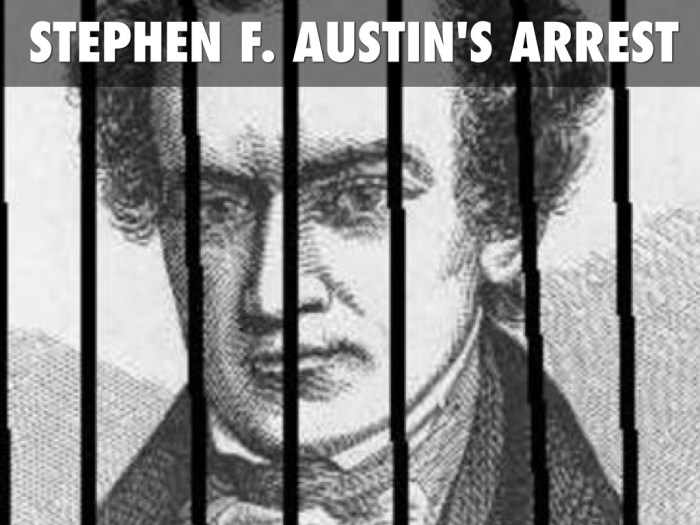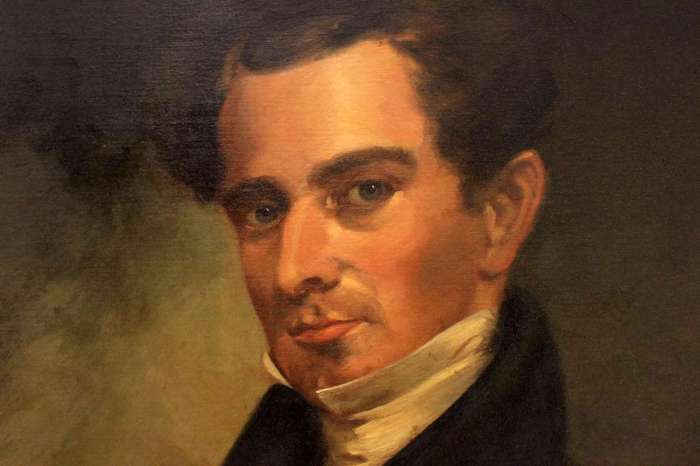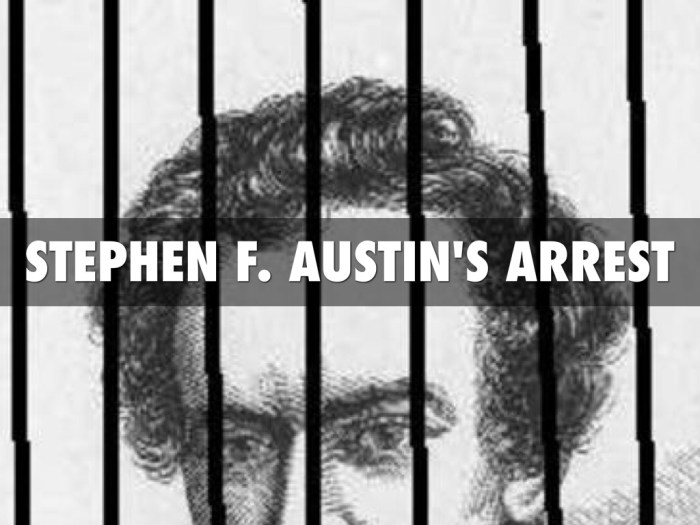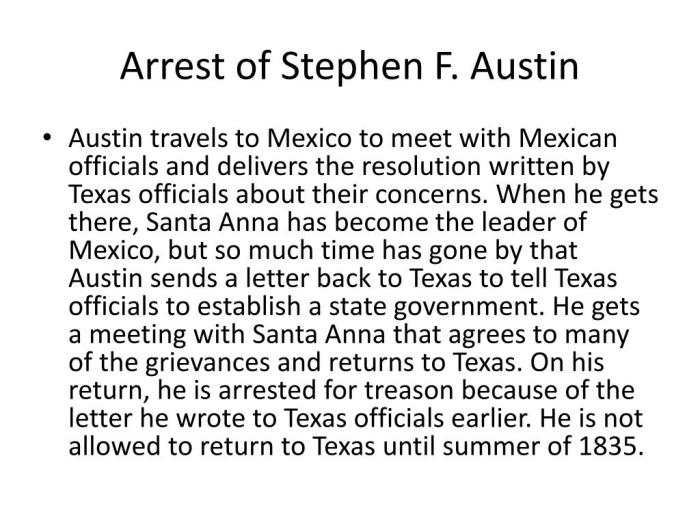The arrest of Stephen F. Austin, a pivotal figure in the history of Texas, was a defining moment that shaped the Lone Star State’s destiny. This enigmatic event, steeped in political turmoil and personal drama, left an enduring legacy that continues to resonate today.
Austin’s arrest stemmed from a complex interplay of factors, including his role in the Texas Revolution and his defiance of Mexican authority. The consequences of his detention were far-reaching, influencing the course of Texas history and the development of the state as a whole.
Arrest of Stephen F. Austin

Stephen F. Austin was a prominent figure in the history of Texas. He was a land speculator and empresario who brought thousands of American settlers to Texas. In 1836, he was arrested by the Mexican government and charged with treason.Austin’s
arrest was a result of his support for the Texas Revolution. In 1835, the Mexican government had sent troops to Texas to suppress the revolution. Austin had initially tried to remain neutral, but he eventually joined the rebels.Austin’s arrest had a significant impact on the Texas Revolution.
It helped to galvanize support for the rebels and led to the eventual defeat of the Mexican army. Austin was eventually released from prison and returned to Texas, where he continued to play a leading role in the development of the state.
Events Leading Up to Austin’s Arrest
The events leading up to Austin’s arrest began in 1832, when the Mexican government passed a law that prohibited further immigration from the United States into Texas. Austin, who had been bringing American settlers to Texas for years, was outraged by this law.
He believed that it would stifle the growth of Texas and make it difficult for him to repay his debts.In 1835, the Mexican government sent troops to Texas to enforce the new immigration law. Austin and other Texans were outraged by this action, and they began to organize a resistance.In
Stephen F. Austin’s arrest sparked outrage and controversy. To understand the medical implications of such a situation, it’s essential to consult credible sources like nihss test answers group b . The arrest highlighted the complex legal and political issues surrounding Austin’s actions.
October 1835, the Texans defeated the Mexican army at the Battle of Gonzales. This victory emboldened the Texans, and they began to form a provisional government.In December 1835, Austin was elected as the commander-in-chief of the Texan army. He led the Texans to several victories over the Mexican army, but he was eventually defeated at the Battle of San Jacinto in April 1836.After
the Battle of San Jacinto, Austin was captured by the Mexican army and taken to Mexico City. He was charged with treason and sentenced to death. However, he was eventually released from prison and returned to Texas, where he continued to play a leading role in the development of the state.
Consequences of Austin’s Arrest
Austin’s arrest had a significant impact on the Texas Revolution. It helped to galvanize support for the rebels and led to the eventual defeat of the Mexican army.Austin’s arrest also had a long-term impact on Texas. It helped to create a sense of Texan identity and unity.
It also helped to lay the foundation for the eventual independence of Texas from Mexico.
Historical Context

The arrest of Stephen F. Austin in 1830 was a pivotal event in the history of Texas. To understand the significance of this event, it is essential to examine the historical context of the time period.
In the early 19th century, Texas was a sparsely populated region claimed by both Spain and Mexico. In 1821, Mexico gained independence from Spain and inherited its claim to Texas. However, the Mexican government struggled to control the vast and remote territory.
Role of Mexico
Mexico’s weak control over Texas led to the rise of Anglo-American settlers in the region. In 1824, the Mexican government granted Stephen F. Austin a land grant to bring 300 families to settle in Texas. Austin’s colony was successful, and soon thousands of Anglo-American settlers were pouring into Texas.
However, the influx of Anglo-American settlers also created tensions with the Mexican government. The Mexican government was concerned about the growing American influence in Texas and feared that the settlers would eventually try to secede from Mexico.
Impact on Texas History

Stephen F. Austin’s arrest was a pivotal event in the history of Texas, shaping the course of the Texas Revolution and the development of Texas as a state.
Influence on the Texas Revolution, Arrest of stephen f. austin
Austin’s arrest in 1835 sparked outrage among the Texas colonists, who saw it as a violation of their rights and an attempt by the Mexican government to suppress their growing independence movement. This outrage played a significant role in galvanizing the colonists to take up arms and fight for their independence.
Impact on Texas Statehood
Austin’s arrest and the subsequent Texas Revolution led to the establishment of the Republic of Texas in 1836. Austin became the first president of the new republic, and his leadership and vision played a crucial role in the development of Texas as a state.
Austin’s arrest can thus be seen as a catalyst for the eventual annexation of Texas by the United States in 1845.
Legacy of Stephen F. Austin

Stephen F. Austin’s legacy as the “Father of Texas” is firmly cemented in Texas history. He is widely recognized for his leadership in establishing Anglo-American settlements in Texas and for his role in the Texas Revolution.Austin’s influence on Texas culture and identity is profound.
His ideals of self-governance, individual liberty, and economic opportunity continue to shape the state’s values and aspirations. Austin’s legacy is honored through numerous monuments, historical sites, and educational institutions. His name graces cities, counties, schools, and universities across Texas.
Commemorations of Stephen F. Austin
Austin’s legacy is commemorated in various ways:
- Statues and Monuments:Statues of Austin stand prominently in the Texas State Capitol, the University of Texas at Austin, and other locations, symbolizing his enduring presence in Texas history.
- Historical Sites:Austin’s home, known as the “Oaks,” is preserved as a state historic site, offering a glimpse into his personal life and contributions.
- Educational Institutions:Stephen F. Austin State University in Nacogdoches and Austin Community College in Austin are named in his honor, perpetuating his legacy in higher education.
Austin’s unwavering dedication to Texas and his vision for its future continue to inspire Texans today. His legacy as a visionary leader and a symbol of Texas pride remains an integral part of the state’s identity.
Helpful Answers
What were the reasons behind Stephen F. Austin’s arrest?
Austin was arrested for his involvement in the Texas Revolution and his defiance of Mexican authority, including his refusal to disarm his militia and his support for Texas independence.
What were the consequences of Austin’s arrest?
Austin’s arrest led to his imprisonment in Mexico City for two years, further strained relations between Texas and Mexico, and contributed to the outbreak of the Texas Revolution.
What was Stephen F. Austin’s legacy?
Austin is remembered as a visionary leader who played a pivotal role in the development of Texas. He is considered the “Father of Texas” and his legacy continues to inspire generations of Texans.
